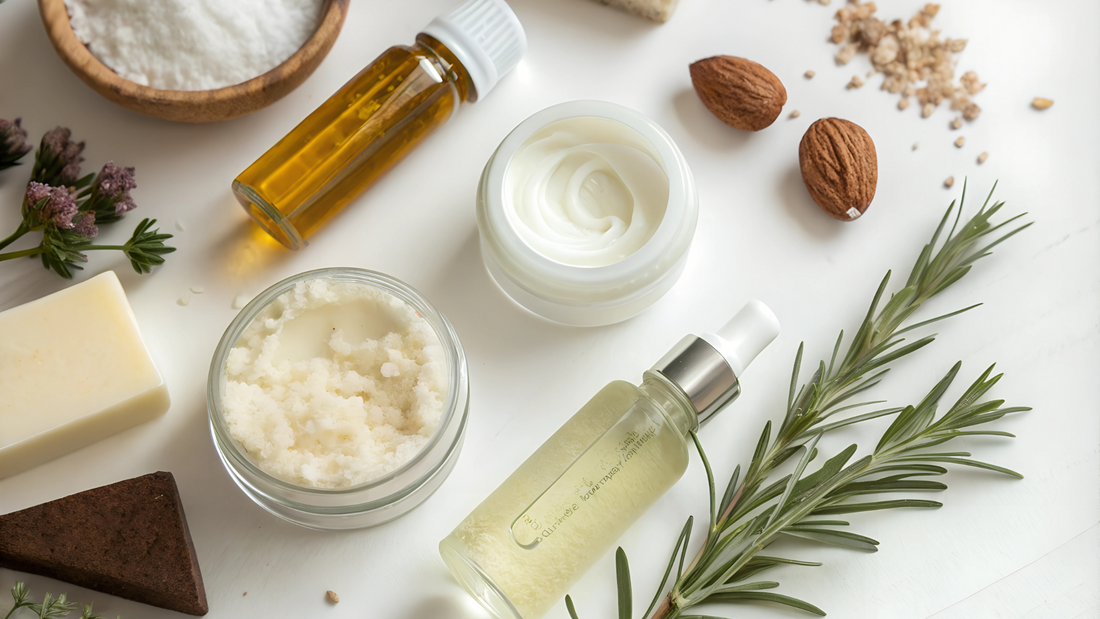
Understanding Natural Skincare: A Guide to Reading Ingredients
Share
In a world of beauty marketing buzzwords and lengthy ingredient lists, navigating natural skincare products can feel overwhelming. Many of us want to make conscious choices about what we put on our skin, but deciphering ingredient labels often requires what seems like a chemistry degree! Let's demystify this process with a straightforward guide to understanding natural skincare ingredients.
Why Ingredients Matter
Your skin is your largest organ and absorbs a significant portion of what you apply to it. Understanding what you're putting on your skin is just as important as being mindful of what you eat. Natural skincare isn't just a trend; it's a mindful choice for both personal health and environmental wellbeing.

Common Natural Ingredients and Their Benefits
Botanical Oils
These powerhouse ingredients are the foundation of many natural skincare products:
- Jojoba Oil: Most closely resembles your skin's natural oils, making it perfect for balancing oil production for all skin types
- Rosehip Oil: Rich in vitamins A and C, helps with cell regeneration and collagen production
- Argan Oil: High in vitamin E and fatty acids, deeply moisturising but lightweight
- Squalane: Derived from olives, provides weightless moisture that mimics a component naturally found in skin
Essential Oils
While providing natural fragrance, essential oils also offer therapeutic benefits:
- Lavender: Calming, balancing, and suitable for most skin types
- Tea Tree: Natural antibacterial properties, excellent for acne-prone skin
- Frankincense: Anti-inflammatory and rejuvenating
- Rosemary: Stimulating and purifying
Clays and Botanical Powders
These natural ingredients provide gentle exfoliation and purification:
- Green Clay: Draws out impurities and excess oils
- Pink Clay: Gentler than green clay, perfect for sensitive skin
- Kaolin Clay: Ultra-gentle, suits all skin types
- Bamboo Powder: Provides natural, biodegradable exfoliation

Ingredients to Approach with Caution
Not all natural ingredients are suitable for everyone. Some to be mindful of include:
- Citrus Essential Oils: Can cause photosensitivity (increased sun sensitivity)
- Cinnamon, Clove, and Peppermint Essential Oils: Potential skin irritants if used in high concentrations
- Coconut Oil: While wonderful for many, can be comedogenic (pore-clogging) for some skin types
- Essential Oil Blends: Always check concentration levels; natural doesn't always mean gentle
Decoding Natural Preservatives
One challenge in natural skincare is preservation. Look for these natural preservation systems (that we use abundantly in ours):
- Vitamin E (Tocopherol): Antioxidant that helps extend shelf life
- Rosemary Extract: Natural antioxidant and preservative
- Radish Root Ferment: Natural antimicrobial preservative
- Sodium Anisate: Derived from anise, provides natural preservation

Red Flags on Ingredient Lists
Be wary of products claiming to be "natural" while containing:
- Parabens: Synthetic preservatives (look for ingredients ending in -paraben)
- Synthetic Fragrances: Often listed simply as "fragrance" or "parfum"
- PEGs (Polyethylene Glycols): Petroleum-derived thickeners
- Silicones: Synthetic ingredients often ending in -cone or -siloxane
The "Natural" Marketing Challenge
Many brands use terms like "natural," "clean," or "green" without regulation. Instead of relying on front-label claims, always check the full ingredient list. A truly natural product will have ingredients you can recognise or easily research.

Simple Guidelines for Reading Labels
Follow these principles when evaluating products:
- Ingredients are listed in descending order by concentration
- The fewer ingredients, the easier it is to identify potential irritants
- If you can't pronounce it or identify its source, research before applying
- Look for transparency; brands should clearly explain what their ingredients do
Beyond the Label: Questions to Ask
When choosing natural skincare, consider:
- Does the brand share their full ingredient lists?
- Are they transparent about sourcing?
- Do they explain the function of unfamiliar ingredients?
- Are their claims backed by specific ingredients?

Finding Your Personal Balance
Remember that "natural" doesn't automatically mean "better for you." The most important factor is finding products that work with your unique skin. Start with simple formulations to easily identify what your skin loves, or doesn't.
At Eva Carys Botanica, we believe in minimal, purposeful ingredient lists where each component serves a specific function. Our philosophy is that effective skincare doesn't need to be complicated; it needs to be thoughtful.
Understanding skincare ingredients is a journey, not a destination. By becoming more informed about what goes into your products, you can make choices that align with both your skin's needs and your personal values.
What natural ingredients have you found work best for your skin? We'd love to hear about your natural skincare discoveries!
